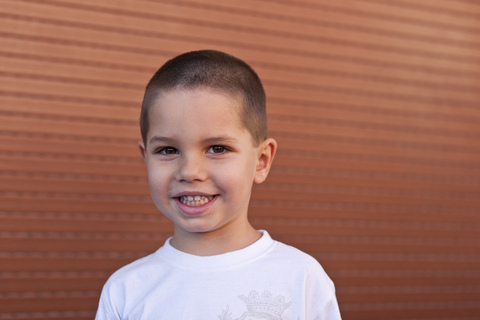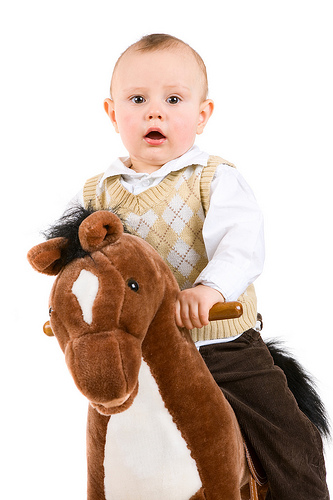March 8th, 2023

The primary teeth are the initial teeth that erupt from a child’s gums in the first few years of childhood. There are a total of 20 primary teeth, most of which will have appeared no later than age three. Because they are only temporary, some parents believe they are less important than the permanent teeth that will emerge around age five or six. However, primary teeth hold a special significance and are important for a child’s long-term oral health.
Function and importance of baby teeth
Baby teeth have several basic functions. Decay can interfere with these functions, and potentially lead to life-long complications. For example, severe tooth decay that causes tooth loss during childhood, perhaps due to sleeping with a bottle at night, can obstruct a child’s speech development. It can also hinder his or her ability to sufficiently chew food.
The primary teeth also serve as place-holders for the permanent teeth. When a primary tooth falls out or must be removed before its time, surrounding teeth may shift into the space the tooth once held. This can cause orthodontic complications once the permanent teeth begin to erupt, which can lead to serious tooth alignment problems and call for extensive orthodontic treatment.
Caring for baby teeth
Dr. Donald Schmitt and Dr. Rinku Saini and our team at Drs. Schmitt & Saini Pediatric Dentistry will tell you it is never too early to begin caring for your child’s teeth. Baby teeth require the same care and attention that permanent teeth do. The American Dental Association recommends that children see a dentist as soon as the teeth begin to erupt from the gums. Early childhood dental visits usually include examinations, cleanings, fluoride treatments, and hygiene education for parents. It is also important to adopt an oral care routine at home that includes daily brushing, flossing, and dietary modifications that support a lifetime of good oral health.
To learn more about baby teeh, or to schedule an appointment with Dr. Donald Schmitt and Dr. Rinku Saini for your little one, please give us a call at our convenient Concord or Danville office!
March 8th, 2023

When you were a kid, your parents may have told you to drink milk to build strong bones and grow tall and strong. Now that you have children of your own, you may hear yourself parroting those instructions you received years ago. Getting enough dairy is essential for young children whose teeth are growing. A child who consumes the recommended daily serving of dairy will develop healthy, strong teeth for the rest of his or her life.
So, which foods are the best in terms of acquiring the right amount of calcium? Milk and other dairy products are excellent sources of calcium. Milk also contains vitamin D, phosphorus, magnesium, and proteins. Magnesium promotes calcium deposits in your enamel, while phosphorus forms a small but important barrier against acidic foods that cause cavities. Vitamin D and protein are used by a child’s body to build bone tissue and maintain dental health.
According to a recent study, the majority of Americans, including children, do not receive enough calcium. In fact, according to the Academy of General Dentistry, only one in five children meets even the minimum standards for calcium consumption. The U.S. Department of Agriculture recommends that children under the age of eight should receive two and a half cups of dairy per day. Children older than eight need three full cups, the same as adult men and women. In addition to milk, eating yogurt is a great way your child can increase his or her dairy consumption. Drinking sugary beverages in place of milk causes cavities and tooth decay.
If your child does not get enough dairy consumption, they run the risk of improper tooth development and other dental health problems. Dr. Donald Schmitt and Dr. Rinku Saini and our team at Drs. Schmitt & Saini Pediatric Dentistry encourage you to monitor your child’s dairy consumption to ensure he or she grows healthy teeth to last a lifetime.
Questions? Give us a call at our Concord or Danville office!
March 1st, 2023

When your child loses a tooth for the first time, you both have a lot to look forward to. Sharing in the “I’m a big kid!” excitement. Tales of the Tooth Fairy or other traditions to mark the occasion. Seeing the start of a beautiful grown-up smile.
But before that baby tooth wiggles all the way out of your child’s mouth, let’s talk about how to handle a loose baby tooth.
- Be mindful of your children’s feelings. Reassure them that this is a normal part of growing up. If they are anxious about losing a tooth, there are children’s books which can help ease their fears in a soothing and entertaining way.
- Crunchy and healthy foods like carrot sticks and apple slices can help the tooth fall out naturally—and nutritiously!
- Encourage careful wiggling. No need for children to yank or pull—time, and a child’s own gentle wiggling with tongue or clean hands, should do the trick. If wiggling the tooth is painful, it might not be ready to come out just yet.
- If a tooth absolutely is ready, but just won’t come out, you can help your child without resorting to a string and a doorknob. Give our Concord or Danville office a call for some suggestions for helping that baby tooth on its way to the Tooth Fairy in a timely—and gentle—fashion.
And if a tooth is clearly loose before its time? Should you encourage its exit?
Probably not. Baby teeth are temporary, but they’re important for your child’s development. They help with speech production, eating and chewing, and serve as placeholders so that permanent teeth can erupt in the right spot at the right time.
There are some situations when a loose baby tooth means a visit to the dentist is in order:
- Baby teeth usually fall out over a period of years, generally from ages 6 through 12. Since children’s teeth tend to fall out in the same order they arrived, if a molar is loose before the front teeth start to wiggle, give your dentist a call.
- If your child suffers a fall, or a sports injury, or any kind of accident that leaves a tooth or teeth loose, call your doctor or dentist right away to make sure there are no serious injuries or chance for infection.
- Any time you feel a tooth is loose that shouldn’t be, make an appointment with your child’s dentist.
Finally, we’ve been talking about loose baby teeth, but loose permanent teeth are another matter entirely.
If you child has a loose permanent tooth due to an injury, or a bad bite, or night-time bruxism (tooth-grinding), or for any other reason, it’s important to call for an appointment immediately. Dr. Donald Schmitt and Dr. Rinku Saini will be able to pinpoint the cause of the problem and can offer some solutions. In the meantime,
- Make sure your child eats soft foods, and tries to eat on the opposite side of the loose tooth.
- Keep the area clean with gentle rinsing instead of brushing and flossing.
- Tell your child not to wiggle it! If the bone or ligaments holding the tooth in place have been damaged, playing with the tooth can make it looser.
A loose baby tooth is a step in your child’s journey to a beautiful, healthy adult smile. Reassure, encourage, and help your child through this rite of passage—and don’t hesitate to call on Dr. Donald Schmitt and Dr. Rinku Saini for advice!
March 1st, 2023

Dr. Donald Schmitt and Dr. Rinku Saini and our team know that cavities know no age boundaries, and that is why we recommend a visit to our Concord or Danville office by a child’s first birthday. That also happens to be the opinion of our friends at the American Academy of Pediatrics, as well as the American Dental Association.
Research has shown that more than one in four kids has had at least one cavity by the time they’re four years old. In fact, many children get cavities as early as age two, which is a critical reason why you should pay us a visit sooner rather than later. Your child’s appointment at Drs. Schmitt & Saini Pediatric Dentistry also covers topics such as the importance of baby teeth, nutrition, development, and any concerns you may have with your child’s dental health. We believe that your child’s first visit with Dr. Donald Schmitt and Dr. Rinku Saini should be an enjoyable and positive one, and we strive to teach good oral care that will enable your child to have a beautiful smile that lasts a lifetime.
To learn more about baby teeth, or to schedule your child’s next visit with Dr. Donald Schmitt and Dr. Rinku Saini, please give us a call today! We look forward to seeing you!




